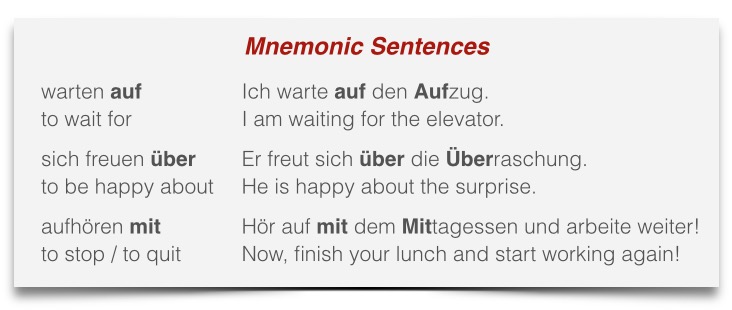


“neben + das = nebens”) are possible, but only the more commonly used ones are listed below. Often in informal spoken German, but are less common in writing. Von-zu.” For the two-way prepositions, sing “An, auf, hin-ter, ne-ben, un-ter/?-ber, in, vor, zwi-i-schen” to the tune of the “An die Freude” chorus from Beethoven’s 9th symphony.Ĭontractions: common contractions of the prepositions with forms of der/das/die are included in the table below where the contraction is in bold print, it is generally (though not always) preferable to the two-word form in speaking and writing contractions not listed in bold print below are heard Mnemonic advice: To remember the accusative prepositions, use the acronym “O Fudge”, or ask your instructor about chanting “Durch-für-gegen-ohne-um, Deutsch zu lernen ist nicht dumm.” For the dative prepositions, sing “Aus-au?er-bei-mit, nach-seit, von-zu” to the tune of the “Blue Danube” waltz, or think of the touching love poem “Roses are red, violets are blue, aus-au?er-bei-mit, nach-seit, Try the second of the “Practice Exercises” on this page ( Wie sagt man…?) in order to get a feel for how these prepositions can be used in various contexts. The compromise used below is to give their primary meanings, and to write “etc.” where other meanings occur particularly often. As a result, it is difficult to give English equivalents for a list like this. Note: As in English, the meanings of the prepositions in German are quite flexible, and very important to know, since these little words come up all the time. Questions on prepositions will often involve these verbs!]Īdditional Useful Prepositions (These will not be explicitly tested in 101-231, but are very good to know, especially for listening and reading! ) Strong Verb/Weak Verb Pairs (stehen/stellen etc.) [Test
#Easy german grammar prepositions how to
Usage Notes: How to say where you are (an, auf, bei, in, zu etc.) Usage Notes: How to say where you are going (an, auf, in, nach, zu) Remember you need a score of at least 80% in order to get a “check” for this assignment. When you are finished, click “Submit” if you are satisfied with your score. Incorrect guesses will reduce your score. THE PROGRAM WILL ONLY CALCULATE YOUR SCORE IF YOU HAVE ANSWERED ALL THE QUESTIONS. IF YOU GET A QUESTION WRONG, KEEP TRYING UNTIL YOU GET IT RIGHT.

You will also find exercises to help you learn accusative, dative, and two-way prepositions. Keep in mind, for example, that if you want to say that you come from (are a native of) a country, you would say, "Ich komme aus Deutschland", whereas if you are coming from one destination to another you would say, for example, "Ich fahre von Bonn nach Koeln." This is important, since German language learners often mix up the prepositions "aus" and "von" and the prepositions "zu" and "nach.". In particular, you will learn and practice prepositions of place and the use of the prepositions "aus", "von", "nach" and "zu". This next set of exercises will help you properly learn and practice German prepositions.


 0 kommentar(er)
0 kommentar(er)
